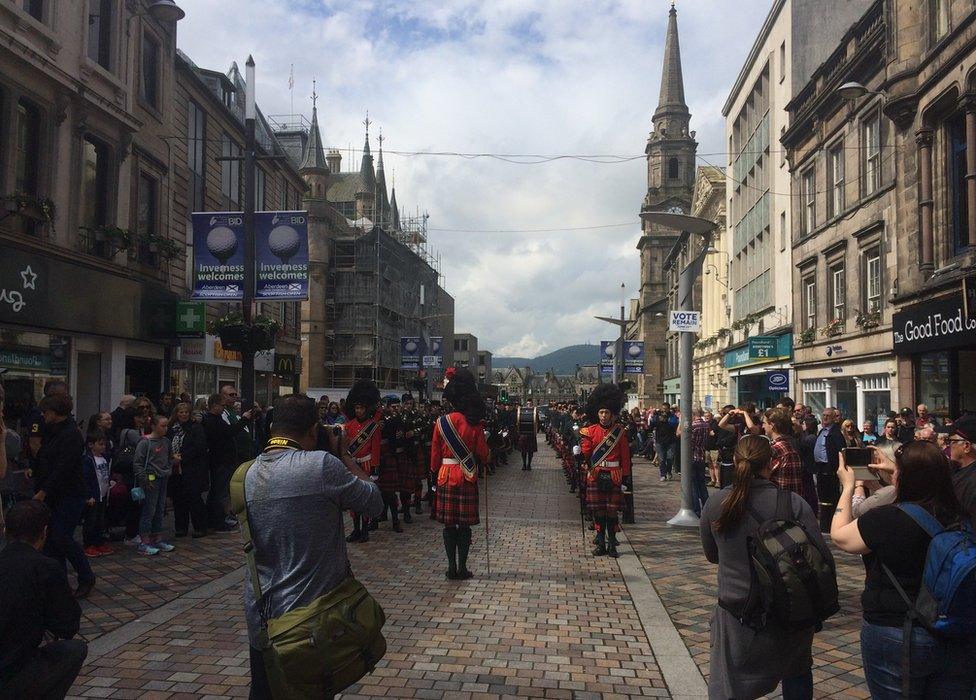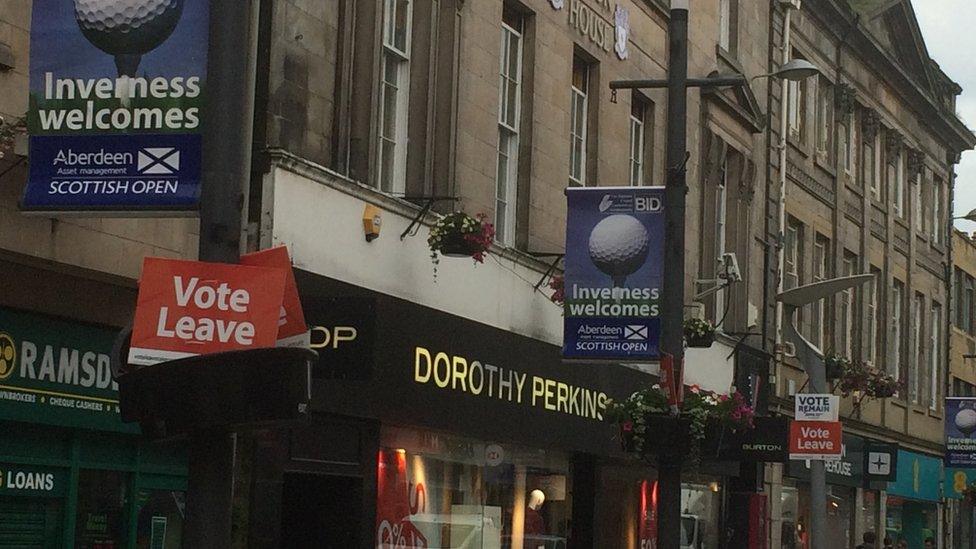Brexit vote: Questions remain in the Highland capital
- Published

A pipe band draws a crowd in Inverness on Friday morning
Their jackets were a giveaway.
The temperature in Inverness this morning was about 16C - t-shirts, shorts and ice cream-fizzing-in-a-coke float weather - but the couple on the High Street were bundled up in raincoats.
The ever present hazard of vox popping in the Highland capital is that nine out of 10 times you will stop a tourist.
The visitors, mainly from Europe, come here in their thousands at almost every time of the year, spilling merrily out of coaches that park below the hilltop Inverness Castle.
Hundreds of tourists in Inverness on Friday were not only treated to fine summer weather, but the sight of a large pipe band in the High Street.
'Rattled cages'
The husband and wife I had stopped were French and gamely entertained my attempt to ask them about the referendum, helped by a few gestures towards the campaign signs tied to nearby lampposts.
Two years ago, during the Scottish independence referendum, the High Street was very quickly festooned with Yes signs. This time the campaign notices were slow to appear and, at first, with a notable absence of those backing Remain.

How has Scotland reacted to the Brexit vote?
BBC Scotland took to the streets of towns and cities across the country to find out what people feel about the decision to leave the EU.

As the final results show, however, that the city and wider Highlands and Islands favoured staying in the EU - 56% of those who voted in the Highlands were for Remain, while the figure was 55% in the Western Isles.
In 1975, when voters last gave their verdict on European membership, the Western Isles returned a decisive "no".
After the isles' latest poll result, islander and Remain campaigner, Lewis MacAskill, told BBC Alba: "It is very significant, especially when you consider the Western Isles was the area back in 1975 that most heavily voted against the then EEC.
"It is a sign of how things have changed and how far we have come along."
Felix Quero, a Leave campaigner on the islands, conceded the result for him locally was disappointing.
But he added: "In the bigger picture it is not such a bad thing. I feel we have rattled the cages of the establishment."
'Friends and neighbours'

Vote Leave and Remain signs in Inverness
Back in Inverness, SNP MP Drew Hendry came into the BBC Scotland studios with a message for the many European migrant workers who live in the city and the wider area.
Almost every community in the Highlands has a family or families from Poland, Estonia, Latvia or Hungary. There also Danes, Spanish and Germans.
Mr Hendry said: "I think people will be shocked about the result and worried.
"But the vote in the Highlands, and across Scotland, show that Scotland sees its place firmly in the EU.
"We are saying very clearly to those EU citizens who live here in the Highlands, who live across Scotland, who are our friends and neighbours, that we will do absolutely everything in our power to make sure we are protecting them and their ability to live and work here."
EU funding
Meanwhile, Inverness Chamber of Commerce chief executive Stewart Nicol said the implications of the result for business had still to be worked out.
He added: "Businesses in the Highlands are very resourceful. We already do a lot of global trade and there is no reason why that can't continue."
"There are also questions over the EU funding that the Highlands and Islands have benefited from over the last few decades. The amount of money coming in was changing anyway, but we need to fully understand what this vote will mean for spending on infrastructure projects."
But what about those French tourists. They still have their coats on but they have warmed to my questions.
"Leave the EU?" asks the woman. She sounded surprised. "Scotland too?" she added.
A question, maybe, for another day.